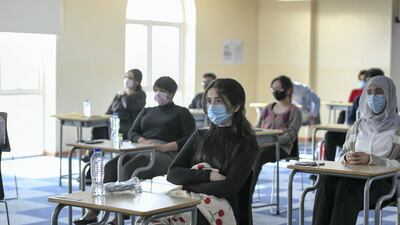Anxiety before examinations is something most people have experienced at some point, but a case of nerves does not mean a pupil's performance will be affected if they have studied hard, a new study has found.
A team at Leibniz Institute for Research and Information in Education in Frankfurt looked at whether anxious pupils performed worse in exam situations than their knowledge would otherwise allow. The study was recently published in Psychological Science, a peer-reviewed journal.
The team studied data from 309 medical pupils who prepared for a high-stakes exam using a digital learning platform. The researchers used log files from the learning platform and assessed pupils’ level of knowledge in the exam-preparation phase and their average performance in mock exams before the final exams.
Canadian University Dubai
The researchers found that test anxiety did not predict exam performance over and above pupils’ knowledge level in the mock exams.
Dr Louise Lambert, associate professor of psychology at Canadian University Dubai said as long as pupils had studied well, nerves would not affect their performance.
“If pupils are prepared, even if they feel anxiety, it doesn't impact their performance so much,” said Dr Lambert.
“Those who are not prepared generally don't do well. But those who aren't prepared and are feeling anxious, probably do even worse.
“Anxiety is not always a bad thing. So if we don't feel any anxiety, our motivation kind of drops a little bit, things become less important, and we're kind of less fired up, and ready and focused to take on a challenge.
“I think it's maybe not the anxiety in itself, but it's knowing how to manage it.
“If you're prepared, then it's just a matter of managing your nerves, but that should not, as this study has shown, impair your performance.”

She said some pupils were extremely anxious, reached the exam hall early, carrying extra supplies, but the anxiety kept them focused and on track.
Dr Lambert said final exams were quite outdated and anxiety provoking.
She called on schools and universities to have frequent and ongoing assessments so that pupils got used to the idea of exams.
The focus, she said, needed to be on gaining knowledge and less on a test.
“I think schools and universities and parents, we put so much importance on a final grade, but actually, it should be about learning,” she said.

Lisa Johnson, principal at the American Academy for Girls, said: “I think the study might be beneficial to help assuage pupils' fears.
“However, when looking at well-being, whether the anxiety is a predictor or not, it still has a tremendous effect on their well-being.
“Schools still have to take into consideration a proper response to test anxiety for pupils to maintain their well-being.”
She said high-stakes exams were outdated and many universities had acknowledged this by removing requirements for SATs.
“Tomorrow's workers do not need to know content. You will see schools switching away from high stakes exams to project-based learning,” she said.
Zeinab Rammal, curriculum and assessment co-ordinator at the American Academy for Girls, said pupils needed problem-solving, innovation and critical thinking skills as these were key for the future.
She said the schools helped pupils who had exam anxiety by helping them prepare in small group tests, so that they did not feel overwhelmed during an exam.
The school also has counsellors to talk to the pupils and help them cope with anxiety.











